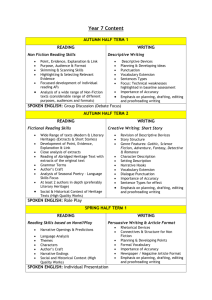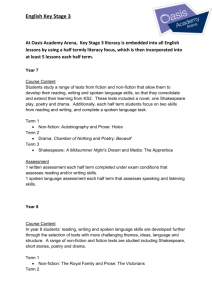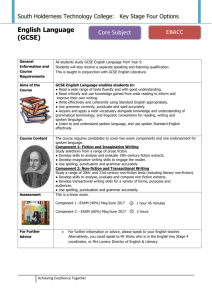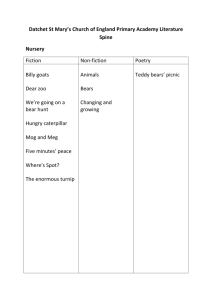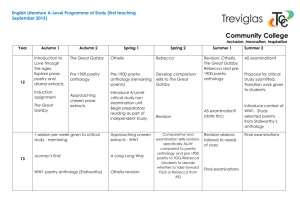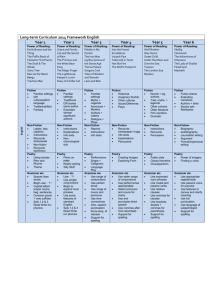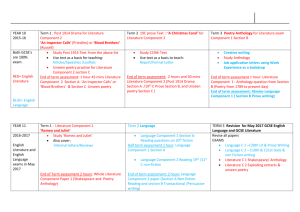Approaches to teaching and learning in English
advertisement
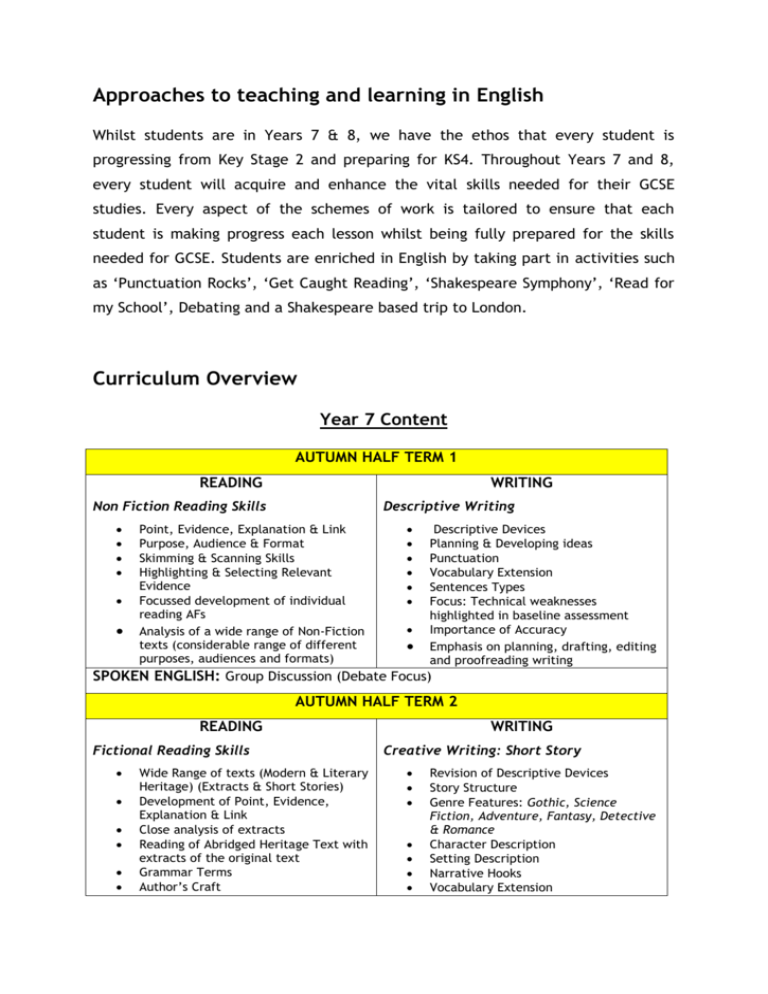
Approaches to teaching and learning in English Whilst students are in Years 7 & 8, we have the ethos that every student is progressing from Key Stage 2 and preparing for KS4. Throughout Years 7 and 8, every student will acquire and enhance the vital skills needed for their GCSE studies. Every aspect of the schemes of work is tailored to ensure that each student is making progress each lesson whilst being fully prepared for the skills needed for GCSE. Students are enriched in English by taking part in activities such as ‘Punctuation Rocks’, ‘Get Caught Reading’, ‘Shakespeare Symphony’, ‘Read for my School’, Debating and a Shakespeare based trip to London. Curriculum Overview Year 7 Content AUTUMN HALF TERM 1 READING WRITING Non Fiction Reading Skills Descriptive Writing Point, Evidence, Explanation & Link Purpose, Audience & Format Skimming & Scanning Skills Highlighting & Selecting Relevant Evidence Focussed development of individual reading AFs Analysis of a wide range of Non-Fiction texts (considerable range of different purposes, audiences and formats) Descriptive Devices Planning & Developing ideas Punctuation Vocabulary Extension Sentences Types Focus: Technical weaknesses highlighted in baseline assessment Importance of Accuracy Emphasis on planning, drafting, editing and proofreading writing SPOKEN ENGLISH: Group Discussion (Debate Focus) AUTUMN HALF TERM 2 READING Fictional Reading Skills Wide Range of texts (Modern & Literary Heritage) (Extracts & Short Stories) Development of Point, Evidence, Explanation & Link Close analysis of extracts Reading of Abridged Heritage Text with extracts of the original text Grammar Terms Author’s Craft WRITING Creative Writing: Short Story Revision of Descriptive Devices Story Structure Genre Features: Gothic, Science Fiction, Adventure, Fantasy, Detective & Romance Character Description Setting Description Narrative Hooks Vocabulary Extension Analysis of Seasonal Poetry – Language Skills Focus At least 2 authors in depth (preferably Literary Heritage) Social & Historical Context of Heritage Texts (High Quality Works) Dialogue Punctuation Importance of Accuracy Sentence Types for effect Emphasis on planning, drafting, editing and proofreading writing SPOKEN ENGLISH: Role Play SPRING HALF TERM 1 READING WRITING Reading Skills based on Novel/Play Persuasive Writing & Article Format Narrative Openings & Predictions Language Analysis Themes Characters Author’s Craft Narrative Endings Social and Historical Context (High Quality Works) Rhetorical Devices Connectives & Structure for Non Fiction Planning & Developing Points Formal Vocabulary Importance of Accuracy Newspaper / Magazine Article Format Emphasis on planning, drafting, editing and proofreading writing SPOKEN ENGLISH: Individual Presentation SPRING HALF TERM 2 READING WRITING Shakespeare Writing to Inform & Explain & Features of the Globe Theatre Biographical Context Elizabethan Context Abridged version of play with analysis of at least 1 extract from the original text. Language analysis Author’s craft Presentational Devices Features of Writing to Inform & Explain Presentational Devices Leaflet Format Analysis of leaflets Emphasis on planning, drafting, editing and proofreading writing SPOKEN ENGLISH: Role Play SUMMER HALF TERM 1 READING Non-Fiction Reading Skills – Including Literary Non Fiction Focussed development of individual reading AFs Wide range of Non-Fiction texts (range of different purposes, audiences and formats) Analysis of Literary Non-Fiction text: travel writing, autobiographies, biographies & diary entries Textual analysis skills Writer’s viewpoint Language Analysis WRITING Writing to Argue & Letter Format Development of Rhetorical Devices Letter Layout Developing Arguments & Counter Arguments Sentences types Importance of Accuracy Connectives & Structure Formal Vocabulary Emphasis on planning, drafting, editing and proofreading writing SPOKEN ENGLISH: Group Discussion (Debate Focus) SUMMER HALF TERM 2 READING WRITING Analysis of Non-Fiction Texts Revision, Poetry Anthology & Unseen Poetry Revision of Non-Fiction textual analysis skills Revision of Point, Evidence, Explanation & Link Poetic Devices Language Analysis Structural Analysis Development of Point, Evidence, Explanation & Link Comparative skills Social & Historical context of anthology poetry (High Quality Works) Themes Unseen poetry skills Descriptive Writing Revision, Poetry Writing & Writing to Review Revision of Descriptive Devices Importance of Accuracy Create own poem based on theme from poetry anthology (Poetic Devices) Writing to Review features Revision of Purpose, Audience & Format Emphasis on planning, drafting, editing and proofreading writing Year 8 Content AUTUMN HALF TERM 1 READING WRITING Fictional Reading Skills Descriptive Writing & Gothic Narrative Wide Range of texts (Modern & Literary Heritage) (Extracts & Short Stories) Development of Point, Evidence, Explanation & Link Close analysis of extracts Reading of Abridged Heritage Text with extracts of the original text Grammar Terms Author’s Craft At least 2 authors in depth (preferably Literary Heritage) Social & Historical Context of Heritage Texts (High Quality Works) Revision of Descriptive Devices Planning & Developing ideas Punctuation Vocabulary Extension Focus: Technical weaknesses highlighted in baseline assessment Story Structure Development of Gothic Genre features Character Description Setting Description Narrative Hooks Dialogue Punctuation Importance of Accuracy Sentence Types for effect SPOKEN ENGLISH: Group Discussion (Debate Focus) AUTUMN HALF TERM 2 READING Shakespeare Revision of features of the Globe Theatre Development of Biographical Context Development of Elizabethan Context WRITING Writing to Inform & Explain & Newspaper Article Format Features of Writing to Inform & Explain Connectives & Structure for Non Abridged version of play with analysis of at least 2 extracts from original. Language analysis Author’s craft Fiction Planning & Developing Points Formal Vocabulary Importance of Accuracy Newspaper Article Format Emphasis on planning, drafting, editing and proofreading writing SPOKEN ENGLISH: Role Play SPRING HALF TERM 1 READING WRITING Non-Fiction Reading Skills – Including Literary Non Fiction Writing to Argue & Leaflet Format Focussed development of individual reading AFs Wide range of Non-Fiction texts -(range of different purposes, audiences and formats) Analysis of Literary Non-Fiction text: travel writing, autobiographies, biographies & diaries Textual analysis skills Writer’s viewpoint Language Analysis Development of Rhetorical Devices Developing Arguments & Counter Arguments Sentences types Importance of Accuracy Connectives & Structure Formal Vocabulary Presentational Devices Leaflet Format Analysis of leaflets SPOKEN ENGLISH: Individual Presentation SPRING HALF TERM 2 READING WRITING Reading Skills based on Novel/Play Narrative Openings & Predictions Language Analysis Themes Characters Author’s Craft Narrative Endings Social and Historical Context (High Quality Works) Writing to Persuade & Letter Format Letter Layout Rhetorical Devices Connectives & Structure for Non Fiction Planning & Developing Points Formal Vocabulary Importance of Accuracy Newspaper / Magazine Article Format Emphasis on planning, drafting, editing and proofreading writing SPOKEN ENGLISH: Group Discussion (Debate Focus) SUMMER HALF TERM 1 READING Reading Skills based on Novel/Play Narrative Openings & Predictions Language Analysis Themes Characters Author’s Craft Narrative Endings Social and Historical Context (High WRITING Writing to review & magazine format Writing to Review features Importance of Accuracy Emphasis on planning, drafting, editing and proofreading writing Connectives & Structure for Non Fiction Planning & Developing Points Quality Works) Formal Vocabulary Magazine Article Format Emphasis on planning, drafting, editing and proofreading writing SPOKEN ENGLISH: Role Play SUMMER HALF TERM 2 READING Analysis of Non-Fiction Texts Revision, Poetry Anthology & Unseen Poetry Revision of Non-Fiction textual analysis skills Revision of Point, Evidence, Explanation & Link Poetic Devices Language Analysis Structural Analysis Development of Point, Evidence, Explanation & Link Comparative skills Social & Historical context of anthology poetry (High Quality Works) Themes Unseen poetry skills WRITING Descriptive Writing Revision & Poetry Writing Revision of Descriptive Devices Importance of Accuracy Create own poem based on theme from poetry anthology (Poetic Devices) Revision of Purpose, Audience & Format Emphasis on planning, drafting, editing and proofreading writing
